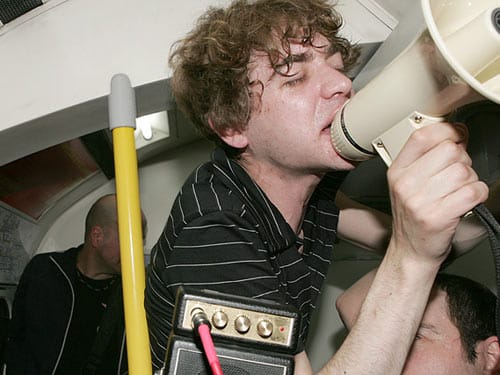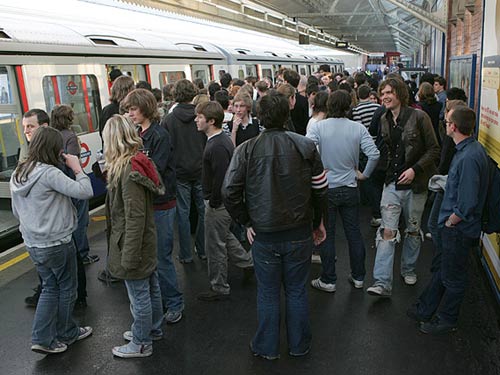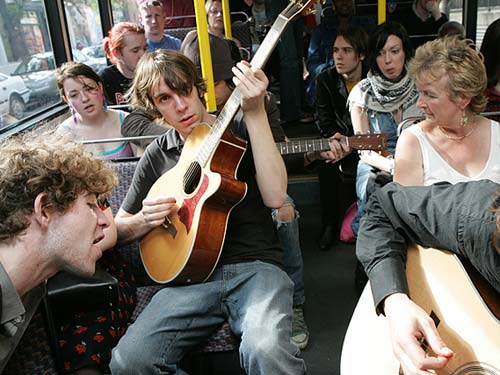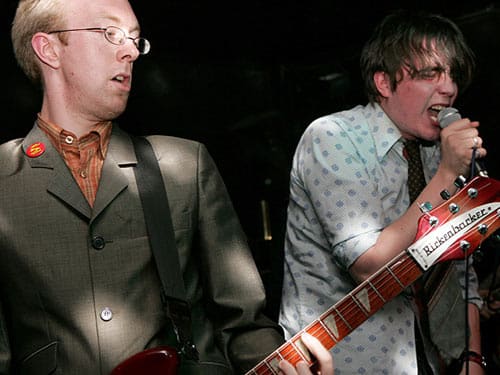
CARDIFF, Wales – Punk is back, and it’s got a laptop. A new breed of alternative British rocker is once again giving the finger to the corporate music machine, thanks to an arsenal of do-it-yourself new media.
Organizing using the Web, cell phones and instant messaging, upstart guitar bands are staging secret, spontaneous concerts at unconventional venues in the latest online music craze, dubbed ‘guerrilla gigging.’
The lifeblood of a resurgent London music scene, guerrilla gigs came to prominence when one of the capital’s hottest new acts, The Others, last month commandeered two London Underground carriages to perform an impromptu set for 200 fans.
While better-established bands might have needed several months and a costly marketing campaign to pull it off, The Others summoned the crowd in just a few hours, with a cryptic message to the band’s Web forum members to meet at a local pub.
Once assembled, fans used SMS messages to tip off friends across town before moving to a nearby tube station to pack an eastbound train for a furious 30-minute set – belted out using a megaphone while onlookers crowd-surfed in transit.
While free concerts are not new, unknown acts’ recent success in distributing music, building a fan base and calling ad hoc performances online eschews the marketing channels of the increasingly risk-averse major record labels, whose support was traditionally seen as critical to finding fame.
Building on the spontaneous public gatherings that are flash mobs, guerrilla gigs took off in November, when Jane’s Addiction flashed notices of London performances to fans using SMS cell-phone messages. This year, celebrated English rockers The Libertines joined in when they started using a fans’ forum to announce concerts for their most loyal followers at the last minute.
Now more and more new artists are finding their relationships with fans, won by giving away MP3s and mingling in message boards, are as rewarding as any pre-planned tour, producing an immediate and energetic crowd for even the most hastily arranged performances.
The thrill comes from just ‘playing for the hell of it,’ according to Art Brut guitarist Chris Chinchilla, who uses an iBook G4 to burn CD-Rs and posts to his band’s forum to announce short-notice guerrilla gigs at venues like funeral parlors and galleries.
‘You never know what to expect. You can arrange a last-minute gig the day before, put it up on your website, send it out to the mailing list, and there will be hundreds of people there,’ he said.
‘Sometimes, the music industry doesn’t want to help, so you just do it any way you can. We use SMS, e-mail, mailing lists, message boards, my Sony Ericsson T68i and technologies like MSN Messenger and iChat; then people pass details on to other people to spread the word.’
Punk 2.0, which one industry representative said constitutes a ‘cyberspace underground rock network’ in Britain, owes less to the form’s orchestrated anarchy and more to the communications tools that have allowed it a crucial support base.
‘We actually know our fans,’ The Others vocalist Dominic Masters told BBC Radio 1 recently, after scrambling users of his message board to a riotous, unauthorized performance in the national broadcaster’s reception area.
‘On our website, we’ve built this affiliation where they’ve got my telephone number on every posting. I’ve got about 500 kids’ names who I talk to, and there are about 1,000 with their e-mail addresses on the website.’
It is a tight-knit following, which has earned The Others the title of ‘the most worshipped new band in Britain,’ and which will follow the group wherever it may call the next surprise set.
‘The strength of this movement is in its community,’ said Imran Ahmed of New Musical Express. ‘Gigs can be organized in a matter of hours. The venue, time and any fee will be communicated via message board, text or blog; the community then congregates at a place beforehand and then all head down to the guerrilla gig together.’
The emerging phenomenon is a perfect example of technology mobilizing cultural collective action, according to author Howard Rheingold, whose latest book, Smart Mobs: The Next Social Revolution, examines how mobile devices help conjure public congregations out of thin air.
‘Just as the Fender guitar was the enabler for the rock ‘n’ roll revolution,’ he said, ‘the mobile phone plus online communication mean that flash mobs, spontaneous gigs and other forms of self-organized entertainment are going to continue to break out and transform the way people get together to meet, entertain and make art.’

Summoned by a cryptic message on The Others’ website, the bands’ fans gather for a guerrilla gig on London’s tube.

The Others’ lead singer, Dominic Masters, belts out a number on the London Underground. The band’s furious 30-minute gig was publicized by a website posting and fans who sent SMS messages to each other.

The Others, which has only released one single so far, plays a guerrilla gig on a London bus. The Others’ vocalist Dominic Masters has no qualms about publishing his cell phone number on the Internet — it puts him just a speed-dial away from his biggest fans.

Chris Chinchilla (left) and Eddie Argos of Art Brut play a guerrilla gig. Inspired by flash mobs, bands can call rapid gigs in the strangest of venues. Funeral parlors, the back of a lorry and a tree in The RegentÂ’s Park are some of the locations to host sets.